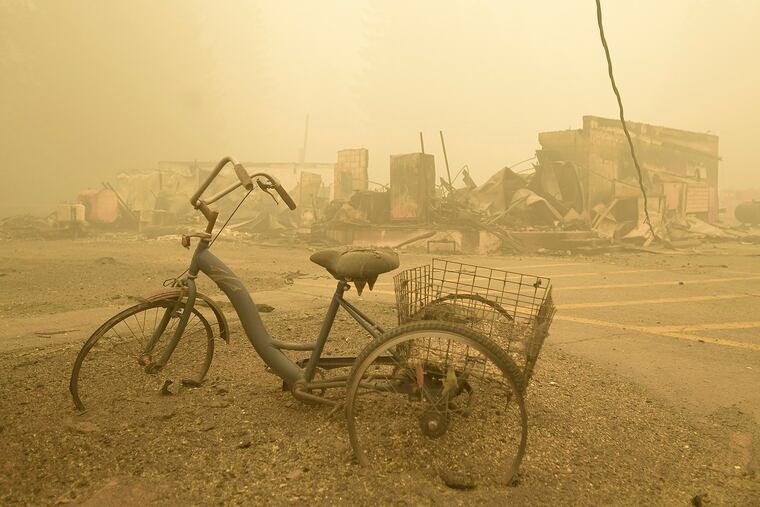The West Coast is burning, but Pa. can help | Will Bunch Newsletter
Plus, a documentary on a tumultuous 1968 week when civil rights preempted Johnny Carson

Beware the Ides of September. The days keep getting shorter. The chance to dine safely outdoors is slipping away. And the Eagles might stink for a change. But The Will Bunch Newsletter is here for you. Did someone forward you this email? Sign up to receive this newsletter weekly at inquirer.com/bunch, and, like Humpty Dumpty, you’ll have a great fall.
Don’t cry about the wildfires. Demand that Pa. finally takes climate change seriously
It used to be the conventional wisdom that Americans couldn’t grasp the threat of climate change because the issue was too abstract. Well, what about now, when amid the shocking burnt-orange pictures of Pacific Coast skylines you read about the 13-year-old boy who died in Oregon’s wildfires while clutching his dog, while his frantic father told a burned, barefoot and barely recognizable woman that he couldn’t stop for her because he was searching for his wife, prompting the woman to whisper, “I am your wife”?
The heartbreaking story of that boy, Wyatt Tofte — whose grandmother also perished as the Beachie Creek fire enveloped Marion County, Oregon — hammered home the humanity of the West Coast wildfires that have claimed at least 36 lives. These annual events keep getting worse every year, in tandem with a warming planet. Indeed, it’s wrong to ever again call climate change a “threat.” It’s here, and it’s killing our fellow Americans — a situation that today can feel helpless in my home state of Pennsylvania, nearly 3,000 miles away.
But the truth is that you (and not only you) can prevent forest fires, even if you live on the other side of the country. That’s because we know that:
Climate change from human-made pollution has created the conditions, from record-high temperatures (121 degrees in Los Angeles, recently) to drought-induced dead trees that serve as nature’s kindling, for 2020′s unprecedented burn.
Pennsylvania produces a disproportionately high 1% of the entire planet’s greenhouse-gas pollution.
The state’s leaders, long in thrall to Big Oil and Gas, could be doing a lot more to curb that pollution than we’re doing now.
Fittingly, the West Coast wildfires have served as the backdrop for the leak of a secret tape recording to the New York Times that captured oil-and-gas leaders admitting that many of the industry’s smaller players are (contrary to what they were telling the public) doing a lousy job controlling methane, the gas which experts say causes global warming at rates as high as 84 times carbon dioxide.
Pennsylvania, a leading fracking state, is finally on the brink of approving new regulations to rein in methane leaks; environmentalists say the pending rule is a good start but doesn’t go far enough. It allows natural-gas wells that pass a couple of state inspections to go a long time before another one — even though wells could spring a new leak during that interval. Perhaps worse, the proposed regs would exempt tens of thousands of smaller conventional wells in Pennsylvania — despite evidence that smaller, independent firms have bad track records on methane.
“It exempts a lot of smaller and older wells, and these have a lot of emissions,” Allen Robinson, who heads the mechanical engineering department at Carnegie-Mellon University and who testified on the state’s methane rules, told me. The Environmental Defense Fund has previously said that 1.1 million tons of methane leak from Pennsylvania’s natural-gas wells each year — more than 15 times higher than the industry claimed.
Meanwhile, the industry has also been caught in a web of lies about the virtue of plastics, which is frequently manufactured from fracked gases and which has been hailed as a way to save Big Oil and Gas amid a worldwide plunge in energy prices. A lengthy NPR investigation established that the major oil and gas companies lied about the ability to recycle cheap plastic, most of which instead will end up clogging landfills.
That matters because Pennsylvania has fallen for Big Oil’s plastics pitch in a big way, approving a massive 25-year, $1.7 billion tax break for Royal Dutch Shell to build a gigantic petrochemical plant on the banks of the Ohio River west of Pittsburgh, with hopes of attracting several more like it. That scheme creates a middling number of permanent jobs in return for more plastic gunk, more fracking, more greenhouse gas pollution — and more wildfires.
This is where you come in. Pennsylvania has lagged other jurisdictions in climate action because too many lawmakers who take too many donations from oil-and-gas executives and lobbyists have been in Harrisburg for too long. The good news is that there’s an election in just seven weeks, and many of these fossils-of-fossil-fuel face challenges from more eco-friendly candidates, particularly in the Philadelphia suburbs.
Pay attention to your state legislative races — in a presidential year, too many folks don’t do that — and then vote like there’s no tomorrow. Smokey the Bear would be proud of you.